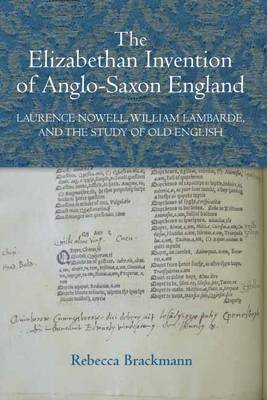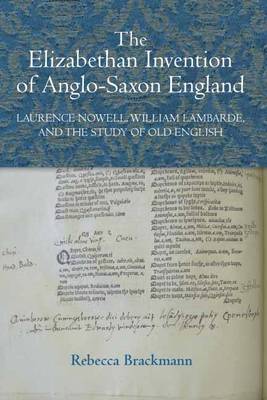
- Afhalen na 1 uur in een winkel met voorraad
- Gratis thuislevering in België vanaf € 30
- Ruim aanbod met 7 miljoen producten
- Afhalen na 1 uur in een winkel met voorraad
- Gratis thuislevering in België vanaf € 30
- Ruim aanbod met 7 miljoen producten
Zoeken
The Elizabethan Invention of Anglo-Saxon England
Laurence Nowell, William Lambarde, and the Study of Old English
Rebecca Brackmann
€ 177,45
+ 354 punten
Omschrijving
The writings of two influential Elizabethan thinkers testify to the influence of Old English law and literature on Tudor society and self-image. Full of fresh and illuminating insights into a way of looking at the English past in the sixteenth century... a book with the potential to deepen and transform our understanding of Tudor attitudes to ethnic identity and the national past. Philip Schwyzer, University of Exeter. Laurence Nowell (1530-c.1570), author of the first dictionary of Old English, and William Lambarde (1536-1601), Nowell's protégé and eventually the first editor of theOld English Laws, are key figures in Elizabethan historical discourses and in its political and literary society; through their work the period between the Germanic migrations and the Norman Conquest came to be regarded as a foundational time for Elizabethan England, overlapping with and contributing to contemporary debates on the shape of Elizabethan English language. Their studies took different strategies in demonstrating the role of early medieval history in Elizabethan national -- even imperial -- identity, while in Lambarde's legal writings Old English law codes become identical with the "ancient laws" that underpinned contemporary common law. Their efforts contradict the assumption that Anglo-Saxon studies did not effectively participate in Tudor nationalism outside of Protestant polemic; instead, it was a vital part of making history "English". Their work furthers our understanding of both the history of medieval studies and the importance of early Anglo-Saxon studies to Tudor nationalism. Rebecca Brackmann is Assistant Professor of English, Lincoln Memorial University.
Specificaties
Betrokkenen
- Auteur(s):
- Uitgeverij:
Inhoud
- Aantal bladzijden:
- 256
- Taal:
- Engels
- Reeks:
- Reeksnummer:
- nr. 30
Eigenschappen
- Productcode (EAN):
- 9781843843184
- Verschijningsdatum:
- 21/06/2012
- Uitvoering:
- Hardcover
- Formaat:
- Genaaid
- Afmetingen:
- 157 mm x 234 mm
- Gewicht:
- 598 g

Alleen bij Standaard Boekhandel
+ 354 punten op je klantenkaart van Standaard Boekhandel
Beoordelingen
We publiceren alleen reviews die voldoen aan de voorwaarden voor reviews. Bekijk onze voorwaarden voor reviews.








